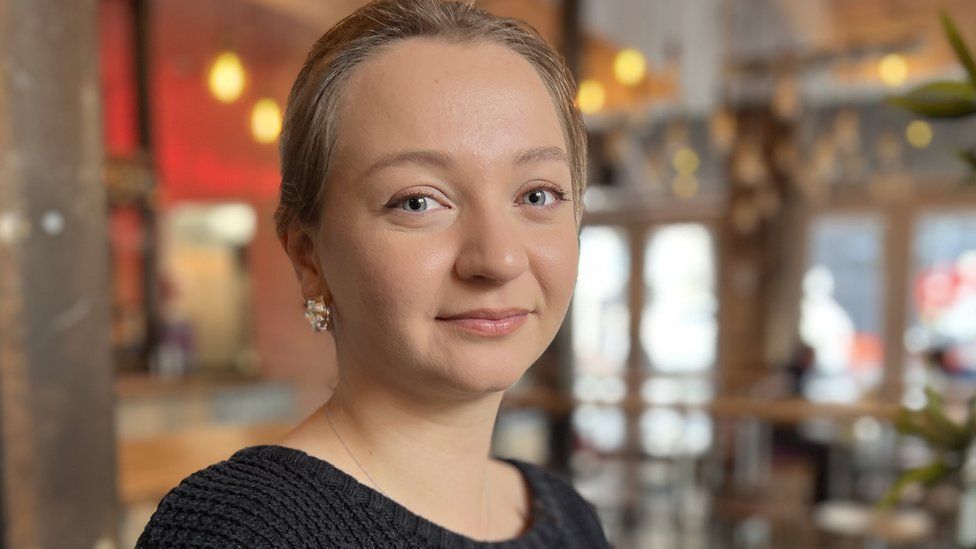ARTICLE AD BOX

Catherine Sheldon says the new rent represents more than half of her monthly income
By Georgina Hayes
BBC Disclosure
Rents in Scotland have risen by more than England despite a high-profile 3% cap on increases imposed by the Scottish government earlier this year.
Catherine Sheldon is one of thousands of young Scots struggling with the cost of living crisis who thought they would be protected from a large rent rise.
However, a "loophole" in the Scottish government's rent cap rules allows her private landlord to seek a 35% rise because one of her flatmates gave notice to move out, ending the tenancy agreement.
The 26-year-old shared the three-bedroom flat in Glasgow with two friends for two-and-a-half years.
Catherine describes the flat as her home but in order to stay living there she would have had to accept her share of the rent rising from £520 per month to £700.
She says her landlord's justification for the increase is that the new price is simply the market rate for the flat - and they appear to be correct.
But Catherine says the new rent represents more than half her monthly income.
"I don't see how these price increases can be sustainable for anyone," she told BBC Disclosure.
"I don't understand who is actually affording it."
Image source, Getty Images
Image caption,The average rent for a two-bedroom flat in Glasgow increased by 82% over a decade to £978
Negotiations to agree a new tenancy with a lesser rent rise failed and Catherine says she is now having to leave the property, with nowhere else to go that she can afford.
"We've basically just decided that we need to leave and find somewhere else to live," she said.
"We've been fighting this since February, and we're all just completely exhausted by the whole situation and we don't think there's anything else we can do."
But Catherine, who is a recent graduate and hospitality worker, is struggling to find anything within her price range and she says she is worried she will be forced out of Glasgow altogether.
"I'm really scared," she said.
"I'd move further out but all my friends and everyone I know live here.
"I'd be worried about being isolated from everyone. I've just been completely overwhelmed by the whole thing."
Image source, Getty Images
Image caption,The average rent for a two-bedroom flat in Edinburgh climbed by 92% over a decade to £1,441
Over the past decade, rents in Scotland's largest cities have almost doubled, according to exclusive data commissioned by BBC Scotland News.
The Rightmove research reveals that between September 2013 and September 2023, the average rent for a two-bedroom flat in Edinburgh climbed by 92% to £1,441, while in Glasgow this increased by 82% to £978.
Despite the emergency legislation capping rent rises at 3%, private rents across Scotland have increased by 6% in the past year, according to the latest Office for National Statistics (ONS) figures.
This figure is higher than London (5.9%).
The statistics show annual private rental costs increased by 5.5% across the UK as a whole, with England at 5.4% and Wales at 6.5%.
England and Wales do not currently have any rent control legislation in place.
'Joint tenancy loophole'
In Scotland, as the impact of cost of living rises such as energy prices began to bite last year, the Scottish government announced a temporary freeze on rent rises.
In April this changed to a 3% cap on increases.
However, campaigners have warned the "joint tenancy loophole" means that, in many flat-shares, landlords are free to increase the rent by as much as they want when one person leaves.
This is because the emergency legislation only applies to tenancies, rather than properties.
Economist and co-director of think tank Future Economy Scotland, Laurie Macfarlane ,described the rent cap as a "sticking plaster" amid a housing crisis in Scotland that private renters are at the very sharp end of.
He told the BBC rent rises were outstripping the growth in incomes and people were spending more of their income than ever before on keeping a roof over their heads.
Sinead McNulty says young people "have no other choice but to flat-share" due to increasing costs
Sinead McNulty, a Living Rent organiser in Edinburgh, had spent months helping tenants fight rent increases when she was hit with one of her own.
She shares a four-bedroom flat and, like Catherine, was hit with a substantial rent hike when one of her flatmates needed to move out.
"We were shocked to find that the rent had increased by £500, which means that our rent individually each was up by £125," she told the BBC.
She says her generation is particularly vulnerable to the "massive loophole" in the rent cap because young people "have no other choice but to flat-share" due to increasing costs.
"People say it's because we live in the city centre, but I know from my friends and my job that wherever you are it's completely unaffordable," Sinead said.
"My friends, my colleagues, can't afford to live in the city any more. For me that's really upsetting but, more than upsetting, it makes me really angry.
"I am genuinely afraid of moving out of this property and spending much more money on rent and actually being homeless," she said.
"If I cannot live here anymore, I know I will struggle to find a home."
Landlords are also being hit by cost of living pressures with mortgage rates rising rapidly along with the cost of complying with regulations.
John Blackwood, of the Scottish Association of Landlords, said he was "not surprised" that some tenants were feeling exploited
John Blackwood, chief executive of the Scottish Association of Landlords, said he was "not surprised" that some tenants were feeling exploited.
"I think tenants are finding it really difficult at the moment, as landlords are finding it difficult," he told the BBC.
"And I feel the government is letting all parties down here. They're not working with us to find these sustainable solutions."
Mr Blackwood said one solution would be "looking at greater predictability of rents and rent increases in the future" in a way that protects the landlord's business.
He added that due to a shortage of alternative affordable housing, private landlords had been asked to provide housing to many more people than they ever expected to and that it had become the "only resort for many renters".
"That's unsustainable and it's not the Scotland that we should be aspiring towards," he said.
In an interview with BBC Scotland, Housing Minister Paul McLennan said he would look at longer-term rent controls in the upcoming Housing Bill.
He said: "There are obviously things we can do in terms of the short-term measures that are in place just now, but looking beyond that and looking to longer-term rent controls, obviously something like that needs to be considered."
The minister added: "I think if you look at rents in other parts of the UK, be that London and Manchester and Newcastle, they are going up with approximately the same kind of figures."
"A lot of it comes down to supply and demand. We need to be building more houses and I am not going to shy away from that."

 1 year ago
41
1 year ago
41








 English (US) ·
English (US) ·